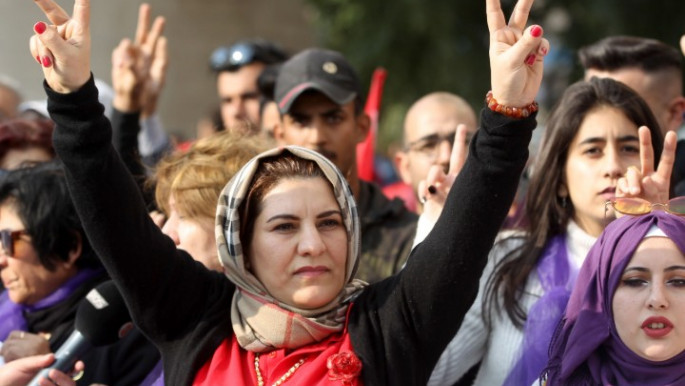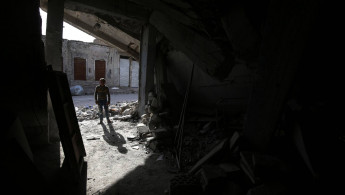The Iraq Report: Thousands of children tortured by Iraqi authorities
According to monitors, children are being held in prisons and are being subjected to torture to force them to confess to membership of the Islamic State group, a breach of international humanitarian law that could reignite violence in the already destabilised country, where millions who require aid have, for all intents and purposes, been abandoned by their government.
While most of these abuses are happening in predominantly Sunni Arab areas, the Shia Arab southern governorates have not been spared state-sponsored violence.
Demonstrators in Basra are out on the streets again to protest against a lack of services, despite the country's vast oil wealth. They have been met by police violence and a heavy crackdown to force them into silence. This is a dangerous development as the more the government silences vocal dissent, the more it ultimately pushes that dissent underground and creates violent resistance.
This is especially dangerous in Iraq, where access to arms is a simple matter and could drag the entire country into even deeper chaos.
Children tortured
The Iraqi authorities in both the federal government in Baghdad and the KRG in Erbil have charged more than a thousand children with terrorism charges for alleged affiliation with IS extremists - often using torture to coerce vulnerable minors into signing confessions, Human Rights Watch said on Wednesday.
In their report, Everyone Must Confess: Abuses Against Children Suspected of ISIS Affiliation in Iraq, HRW said that, by the end of last year, both Baghdad and Erbil had incarcerated 1,500 children for alleged IS membership or affiliation. According to the international rights monitor, many of these children were rushed through hastily convened trials, put before "investigative judges" with evidence extracted through torture, and then sentenced to lengthy prison terms.
"The approach that Iraq has adopted is one that completely fails to acknowledge what is commonly understood and reflected in international law, which is that children who were forcibly recruited are indeed victims; they should be treated as victims not as criminals," said Belkis Wille, senior Iraq researcher at Human Rights Watch.
In the case of the authorities in Baghdad, there appears to be a sectarian element to the incarcerations as most of these children have been taken from areas where the Sunni Arab demographic forms the majority. A racial element also exists where Kurdish KRG forces have also detained Arabs and a minority of Turkmen.
This religiously and racially motivated approach to criminal justice has the capacity to exacerbate - not alleviate - the tensions that allowed IS to flourish in the first place.
"Children accused of affiliation with IS are being detained, and often tortured and prosecuted, regardless of their actual level of involvement with the group," said Jo Becker, children's rights advocacy director for HRW. "This sweeping punitive approach is not justice, and will create lifelong negative consequences for many of these children."
Once released from prison, many of these children will have grown up in an abnormal environment and will undoubtedly suffer from additional psychological trauma. Such children could easily develop into very traumatised and troubled young adults, and may turn to violence to rectify the wrong that has been perpetrated against them.
In other words, Baghdad and Erbil may very well be creating the next generation of hardened, violent jihadists who are now more susceptible than ever to IS and al-Qaeda propaganda about the failings of modern state and society in the Middle East.
 |
| Women in central Baghdad marked International Women's Day in Tahrir Square on Friday [AFP] |
IS continues attacks as IDPs languish
Already, these ethno-sectarian policies are having an effect and allowing IS to stage a comeback and continue to operate - despite their declared "defeat" in December 2017.
IS militants reportedly ambushed a military convoy of Iran-sponsored and Iraq-sanctioned Shia militants fighting under the banner of the Popular Mobilisation Forces (PMF) on Wednesday, killing six and wounding 31. The PMF - known as the Hashd al-Shaabi in Arabic - announced that the attack occurred at night, near the town of Makhmour in northern Iraq.
Although IS has yet to claim responsibility, its activities have been increasing in the area, leading many to blame them as the most likely culprit. Also, the attack was highly organised and efficient, leading to a very high casualty rate among the Shia militants.
Makhmour was until only recently a mixed ethnicity town shared by both Arabs and Kurds. However, and following the IS takeover of a third of Iraq, KRG Peshmerga fighters and other Kurdish militants forced out many of their Arab neighbours, blaming them for IS' actions. This was criticised at the time as something that could fuel future violence, and it seems that after years of not being allowed to return home, IS is once more exploiting communal divisions to operate in areas where the state has forsaken its citizens.
| Facebook Post |
Such attacks are only likely to increase, particularly as the Iraqi government has yet to alleviate the suffering of those most affected by IS' actions and the government's and allied Shia militias' military response that razed many cities to the ground.
The New Arab's Arabic-language service reported that, outside Mosul alone, 150,000 families were waiting for their homes to be rebuilt almost two years after IS was forced out of its Iraqi stronghold. These families were living in dire conditions and feel as though they have been abandoned by the authorities.
Similarly, the latest United Nations figures state that 1.8 million Iraqis are displaced - and 54 percent of them have been displaced for three or more years. If IDPs continue to languish in camps with little prospects for their future, they may look elsewhere for help and this can easily be exploited by those looking to destabilise the country.
Basra protests face off against police brutality
The major oil-rich city of Basra in Iraq's south has also witnessed another outbreak of popular anger as Basrans returned to the streets on Thursday in what appears to be the latest in a series of protests that have rocked the southern metropolis since last summer.
Hundreds of demonstrators gathered outside the provincial capital's main administrative building, demanding improved services, better economic opportunities, and for the judiciary to hold "corrupt" officials to account for what activists said were their failures to ensure citizens' rights were protected. They also demanded an end to the water and power crisis that has plagued the city and much of the rest of the country for more than a decade.
The New Arab reported that demonstrators were chanting for the governor of Basra, Asad al-Aydani, and his cabinet to resign and to be tried for negligence, mismanagement and corruption.
Local authorities responded to the unarmed protests by dispatching police units who beat the demonstrators with batons and hoses, leading to fistfights breaking out in central Basra between civilians and security forces.
Apart from a health crisis emerging from polluted drinking water and severe power cuts affecting hospitals and other critical services, Basra has been at the centre of a drug epidemic with the coastal city's access to the rest of Iraq as well as the Gulf making it an attractive market for Iranian drug runners and their Shia militia partners who have been criticised for operating like organised criminals.
Iraqis were incensed this week when Prime Minister Adel Abdul Mahdi said that Iraq was being flooded by drugs from Argentina - completely failing to mention the flow of drugs from Afghanistan, through Iran, that have created an addiction crisis the likes of which have never been witnessed in Iraq before, as detailed in previous Iraq Reports.
Iraqi social media activists took to Twitter and Facebook to criticise the prime minister, and some mockingly renamed Iran as "Argentina" on a map of the region.
If the Iraqi political class fails to alleviate the suffering of the Shia communities in the south of the country and continues to persecute the Sunnis in the centre and north of Iraq, then they may be creating their own downfall by alienating their main voter base while persecuting citizens who happen to follow a different sect.
This may not spell the end of Iraq as a nation-state, but could well spell the end of the country's political process as we know it.



